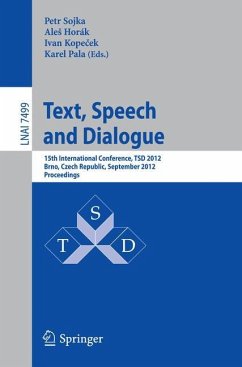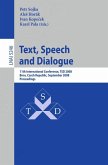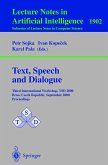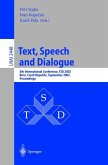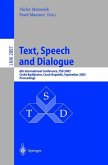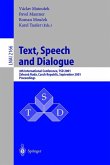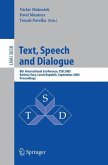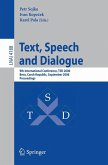Text, Speech and Dialogue
15th International Conference, TSD 2012, Brno, Czech Republic, September 3-7, 2012, Proceedings
Herausgegeben:Sojka, Petr; Horak, Ales; Kopecek, Ivan; Pala, Karel
Text, Speech and Dialogue
15th International Conference, TSD 2012, Brno, Czech Republic, September 3-7, 2012, Proceedings
Herausgegeben:Sojka, Petr; Horak, Ales; Kopecek, Ivan; Pala, Karel
- Broschiertes Buch
- Merkliste
- Auf die Merkliste
- Bewerten Bewerten
- Teilen
- Produkt teilen
- Produkterinnerung
- Produkterinnerung
This book constitutes the refereed proceedings of the 15th International Conference on Text, Speech and Dialogue, TSD 2012, held in Brno, Czech Republic, in September 2012.The 82 papers presented together with 2 invited talks were carefully reviewed and selected from 173 submissions. The papers are organized in topical sections on corpora and language resources, speech recognition, tagging, classification and parsing of text and speech, speech and spoken language generation, semantic processing of text and speech, integrating applications of text and speech processing, machine translation, automatic dialogue systems, multimodal techniques and modeling.…mehr
Andere Kunden interessierten sich auch für
![Text, Speech and Dialogue Text, Speech and Dialogue]() Text, Speech and Dialogue76,99 €
Text, Speech and Dialogue76,99 €![Text, Speech and Dialogue Text, Speech and Dialogue]() Petr Sojka / Ivan Kopecek / Karel Pala (eds.)Text, Speech and Dialogue39,99 €
Petr Sojka / Ivan Kopecek / Karel Pala (eds.)Text, Speech and Dialogue39,99 €![Text, Speech and Dialogue Text, Speech and Dialogue]() Petr Sojka / Ivan Kopecek / Karel Pala (eds.)Text, Speech and Dialogue39,99 €
Petr Sojka / Ivan Kopecek / Karel Pala (eds.)Text, Speech and Dialogue39,99 €![Text, Speech and Dialogue Text, Speech and Dialogue]() Vaclav Matousek / Pavel Mautner (eds.)Text, Speech and Dialogue39,99 €
Vaclav Matousek / Pavel Mautner (eds.)Text, Speech and Dialogue39,99 €![Text, Speech and Dialogue Text, Speech and Dialogue]() Vaclav Matousek / Paul Mautner / Roman Moucek / Karel Tauser (eds.)Text, Speech and Dialogue39,99 €
Vaclav Matousek / Paul Mautner / Roman Moucek / Karel Tauser (eds.)Text, Speech and Dialogue39,99 €![Text, Speech and Dialogue Text, Speech and Dialogue]() Václav Matoušek / Pavel Mautner / Tomáš Pavelka (eds.)Text, Speech and Dialogue38,99 €
Václav Matoušek / Pavel Mautner / Tomáš Pavelka (eds.)Text, Speech and Dialogue38,99 €![Text, Speech and Dialogue Text, Speech and Dialogue]() Petr Sojka / Ivan Kopecek / Karel PalaText, Speech and Dialogue78,99 €
Petr Sojka / Ivan Kopecek / Karel PalaText, Speech and Dialogue78,99 €-
-
-
This book constitutes the refereed proceedings of the 15th International Conference on Text, Speech and Dialogue, TSD 2012, held in Brno, Czech Republic, in September 2012.The 82 papers presented together with 2 invited talks were carefully reviewed and selected from 173 submissions. The papers are organized in topical sections on corpora and language resources, speech recognition, tagging, classification and parsing of text and speech, speech and spoken language generation, semantic processing of text and speech, integrating applications of text and speech processing, machine translation, automatic dialogue systems, multimodal techniques and modeling.
Produktdetails
- Produktdetails
- Lecture Notes in Computer Science 7499
- Verlag: Springer / Springer Berlin Heidelberg / Springer, Berlin
- Artikelnr. des Verlages: 978-3-642-32789-6
- 2012
- Seitenzahl: 716
- Erscheinungstermin: 1. August 2012
- Englisch
- Abmessung: 235mm x 155mm x 39mm
- Gewicht: 1058g
- ISBN-13: 9783642327896
- ISBN-10: 3642327893
- Artikelnr.: 36147290
- Herstellerkennzeichnung
- Springer-Verlag GmbH
- Tiergartenstr. 17
- 69121 Heidelberg
- ProductSafety@springernature.com
- Lecture Notes in Computer Science 7499
- Verlag: Springer / Springer Berlin Heidelberg / Springer, Berlin
- Artikelnr. des Verlages: 978-3-642-32789-6
- 2012
- Seitenzahl: 716
- Erscheinungstermin: 1. August 2012
- Englisch
- Abmessung: 235mm x 155mm x 39mm
- Gewicht: 1058g
- ISBN-13: 9783642327896
- ISBN-10: 3642327893
- Artikelnr.: 36147290
- Herstellerkennzeichnung
- Springer-Verlag GmbH
- Tiergartenstr. 17
- 69121 Heidelberg
- ProductSafety@springernature.com
Part I: Invited Papers.-Getting to Know Your Corpus.-Coreference Resolution: To What Extent Does It Help NLP Applications?.-Part II: Text Semantic Similarity Functions in Word Sense Disambiguation.-Opinion Mining on a German Corpus of a Media Response Analysis.-The Soundex Phonetic Algorithm Revisited for SMS Text Representation.-Sentence Modality Assignment in the Prague Dependency Treebank.-Literacy Demands and Information to Cancer Patients.-Expanding Opinion Attribute Lexicons.-Taggers Gonna Tag: An Argument against Evaluating Disambiguation.-Capacities of Morphosyntactic Taggers..-An Ambiguity Aware Treebank Search Tool.-A New Annotation Tool for Aligned Bilingual Corpora.-Optimizing Sentence Boundary Detection for Croatian.-Mining the Web for Idiomatic Expressions Using Metalinguistic Markers.-Using Tree Transducers for Detecting Errors in a Treebank of Polish.-Combining Manual and Automatic Annotation of a Learner Corpus.-A Manually Annotated Corpus of Pharmaceutical Patents.-Large-Scale Experiments with NP Chunking of Polish.-Mapping a Lexical Semantic Resource to a Common Framework of Computational Lexicon.-The Rule-Based Approach to Czech Grammaticalized Alternations.-Semi-supervised Acquisition of Croatian Sentiment Lexicon.-Towards a Constraint Grammar Based Morphological Tagger for Croatian.-A Type-Theoretical Wide-Coverage Computational Grammar for Swedish.-Application of Lemmatization and Summarization Methods in Topic Identification Module for Large Scale Language Modeling Data Filtering -Experiments and Results with Diacritics Restoration in Romanian.-Supervised Distributional Semantic Relatedness.-PSI-Toolkit: How to Turn a Linguist into a Computational Linguist .-Heterogeneous Named Entity Similarity Function.-Joint Part-of-Speech Tagging and Named Entity Recognition Using Factor Graphs .-Assigning Deep Lexical Types.-SBFC: An Efficient Feature Frequency-Based Approach to Tackle Cross-LingualWord Sense Disambiguation.-Dependency Relations Labeller for Czech.-Preliminary Study on Automatic Induction of Rules for Recognition of Semantic Relations between Proper Names in Polish Texts.-Actionable Clause Detection from Non-imperative Sentences in Howto Instructions: A Step for Actionable Information Extraction.Authorship Attribution: Comparison of Single-Layer and Double-Layer Machine Learning.-Key Phrase Extraction of Lightly Filtered Broadcast News.-Using a Double Clustering Approach to Build Extractive Multi-document Summaries.-A Comparative Study of the Impact of Statistical and Semantic Features in the Framework of Extractive Text Summarization.-Using Dependency-Based Annotations for Authorship Identification.-A Space-Efficient Phrase Table Implementation Using Minimal Perfect Hash Functions.-Common Sense Inference Using Verb Valency Frames.-A Genetic Programming Experiment in Natural Language Grammar Engineering.-User Modeling for Language Learning in Facebook.-Detection of Semantic Compositionality Using Semantic Spaces .-User Adaptation in a Hybrid MT System: Feeding User Corrections into Synchronous Grammars and System Dictionarie.-Using Cognates to Improve Lexical Alignment Systems.-Disambiguating Word Translations with Target Language Models.-English-Vietnamese Machine Translation of Proper Names: Error Analysis and Some Proposed Solutions.-Improved Phrase Translation Modeling Using MAP Adaptation.-Part III: Speech.-A Romanian Language Corpus for a Commercial Text-To-Speech Application.-Making Community and ASR Join Forces in Web Environment.-Unsupervised Synchronization of Hidden Subtitles with Audio Track Using Keyword Spotting Algorithm .-Did You Say what I Think You Said? Towards a Language-Based Measurement of a Speech Recognizers Confidence.-Dealing with Numbers in Grapheme-Based Speech Recognition.-Discretion of Speech Units for the Text Post-processing Phase of Automatic Transcription (in the Czech Language) .-On the Impact of AnnotationErrors on Unit-Selection Speech Synthesis ..-Analysis of the Influence of Speech Corpora in the PLDA Verification in the Task of Speaker Recognition.-Adaptive Language Modeling with a Set of Domain Dependent Model.-Robust Adaptation Techniques Dealing with Small Amount of Data.-.Language Modeling of Nonverbal Vocalizations in Spontaneous Speech.-Acoustic Segmentation Using Group Delay Functions and Its Relevance to Spoken Keyword Spotting.-An In-Car Speech Recognition System for Disabled Drivers .-Captioning of Live TV Programs through Speech Recognition and Re-speaking.-Investigation on Most Frequent Errors in Large-Scale Speech Recognition Applications..- Neural Network Language Model with Cache.-TENOR: A Lexical Normalisation Tool for Spanish Web 2.0 Texts.-A Bilingual HMM-Based Speech Synthesis System for Closely Related Languages.-The Role of Nasal Contexts on Quality of Vowel Concatenations.-Analysis and Assessment of State Relevance in HMM-Based Feature Extraction Method .-On the Impact of Non-speech Sounds on Speaker Recognition.-Automatic Rating of Hoarseness by Text-Based Cepstral and Prosodic Evaluation.-Improving the Classification of Healthy and Pathological Continuous Speech .Part IV: Dialogue.-Using Foot-Syllable Grammars to Customize Speech Recognizers for Dialogue Systems.-Coupled Pragmatic and Semantic Automata in Spoken Dialogue Management.-Exploration of Metaphor and Affect Sensing Using Semantic Interpretation in an Intelligent Agent.-Sentence Classification with Grammatical Errors and Those Out of Scope of Grammar Assumption for Dialogue-Based CALL Systems.-Spoken Dialogue System Design in 3 Weeks.-Integrating Dialogue Systems with Images.-Natural Language Understanding: From Laboratory Predictions to Real Interactions .-Unsupervised Clustering of Prosodic Patterns in Spontaneous Speech .-Czech Expressive Speech Synthesis in Limited Domain: Comparison of Unit Selection and HMM-Based Approaches .-Aggression Detection in Speech Using Sensor and Semantic Information.-Question Classification with Active Learning.-2B$ - Testing Past Algorithms in Nowadays Web .-Morphological Resources for Precise Information Retrieval.-
Part I: Invited Papers.-Getting to Know Your Corpus.-Coreference Resolution: To What Extent Does It Help NLP Applications?.-Part II: Text Semantic Similarity Functions in Word Sense Disambiguation.-Opinion Mining on a German Corpus of a Media Response Analysis.-The Soundex Phonetic Algorithm Revisited for SMS Text Representation.-Sentence Modality Assignment in the Prague Dependency Treebank.-Literacy Demands and Information to Cancer Patients.-Expanding Opinion Attribute Lexicons.-Taggers Gonna Tag: An Argument against Evaluating Disambiguation.-Capacities of Morphosyntactic Taggers..-An Ambiguity Aware Treebank Search Tool.-A New Annotation Tool for Aligned Bilingual Corpora.-Optimizing Sentence Boundary Detection for Croatian.-Mining the Web for Idiomatic Expressions Using Metalinguistic Markers.-Using Tree Transducers for Detecting Errors in a Treebank of Polish.-Combining Manual and Automatic Annotation of a Learner Corpus.-A Manually Annotated Corpus of Pharmaceutical Patents.-Large-Scale Experiments with NP Chunking of Polish.-Mapping a Lexical Semantic Resource to a Common Framework of Computational Lexicon.-The Rule-Based Approach to Czech Grammaticalized Alternations.-Semi-supervised Acquisition of Croatian Sentiment Lexicon.-Towards a Constraint Grammar Based Morphological Tagger for Croatian.-A Type-Theoretical Wide-Coverage Computational Grammar for Swedish.-Application of Lemmatization and Summarization Methods in Topic Identification Module for Large Scale Language Modeling Data Filtering -Experiments and Results with Diacritics Restoration in Romanian.-Supervised Distributional Semantic Relatedness.-PSI-Toolkit: How to Turn a Linguist into a Computational Linguist .-Heterogeneous Named Entity Similarity Function.-Joint Part-of-Speech Tagging and Named Entity Recognition Using Factor Graphs .-Assigning Deep Lexical Types.-SBFC: An Efficient Feature Frequency-Based Approach to Tackle Cross-LingualWord Sense Disambiguation.-Dependency Relations Labeller for Czech.-Preliminary Study on Automatic Induction of Rules for Recognition of Semantic Relations between Proper Names in Polish Texts.-Actionable Clause Detection from Non-imperative Sentences in Howto Instructions: A Step for Actionable Information Extraction.Authorship Attribution: Comparison of Single-Layer and Double-Layer Machine Learning.-Key Phrase Extraction of Lightly Filtered Broadcast News.-Using a Double Clustering Approach to Build Extractive Multi-document Summaries.-A Comparative Study of the Impact of Statistical and Semantic Features in the Framework of Extractive Text Summarization.-Using Dependency-Based Annotations for Authorship Identification.-A Space-Efficient Phrase Table Implementation Using Minimal Perfect Hash Functions.-Common Sense Inference Using Verb Valency Frames.-A Genetic Programming Experiment in Natural Language Grammar Engineering.-User Modeling for Language Learning in Facebook.-Detection of Semantic Compositionality Using Semantic Spaces .-User Adaptation in a Hybrid MT System: Feeding User Corrections into Synchronous Grammars and System Dictionarie.-Using Cognates to Improve Lexical Alignment Systems.-Disambiguating Word Translations with Target Language Models.-English-Vietnamese Machine Translation of Proper Names: Error Analysis and Some Proposed Solutions.-Improved Phrase Translation Modeling Using MAP Adaptation.-Part III: Speech.-A Romanian Language Corpus for a Commercial Text-To-Speech Application.-Making Community and ASR Join Forces in Web Environment.-Unsupervised Synchronization of Hidden Subtitles with Audio Track Using Keyword Spotting Algorithm .-Did You Say what I Think You Said? Towards a Language-Based Measurement of a Speech Recognizers Confidence.-Dealing with Numbers in Grapheme-Based Speech Recognition.-Discretion of Speech Units for the Text Post-processing Phase of Automatic Transcription (in the Czech Language) .-On the Impact of AnnotationErrors on Unit-Selection Speech Synthesis ..-Analysis of the Influence of Speech Corpora in the PLDA Verification in the Task of Speaker Recognition.-Adaptive Language Modeling with a Set of Domain Dependent Model.-Robust Adaptation Techniques Dealing with Small Amount of Data.-.Language Modeling of Nonverbal Vocalizations in Spontaneous Speech.-Acoustic Segmentation Using Group Delay Functions and Its Relevance to Spoken Keyword Spotting.-An In-Car Speech Recognition System for Disabled Drivers .-Captioning of Live TV Programs through Speech Recognition and Re-speaking.-Investigation on Most Frequent Errors in Large-Scale Speech Recognition Applications..- Neural Network Language Model with Cache.-TENOR: A Lexical Normalisation Tool for Spanish Web 2.0 Texts.-A Bilingual HMM-Based Speech Synthesis System for Closely Related Languages.-The Role of Nasal Contexts on Quality of Vowel Concatenations.-Analysis and Assessment of State Relevance in HMM-Based Feature Extraction Method .-On the Impact of Non-speech Sounds on Speaker Recognition.-Automatic Rating of Hoarseness by Text-Based Cepstral and Prosodic Evaluation.-Improving the Classification of Healthy and Pathological Continuous Speech .Part IV: Dialogue.-Using Foot-Syllable Grammars to Customize Speech Recognizers for Dialogue Systems.-Coupled Pragmatic and Semantic Automata in Spoken Dialogue Management.-Exploration of Metaphor and Affect Sensing Using Semantic Interpretation in an Intelligent Agent.-Sentence Classification with Grammatical Errors and Those Out of Scope of Grammar Assumption for Dialogue-Based CALL Systems.-Spoken Dialogue System Design in 3 Weeks.-Integrating Dialogue Systems with Images.-Natural Language Understanding: From Laboratory Predictions to Real Interactions .-Unsupervised Clustering of Prosodic Patterns in Spontaneous Speech .-Czech Expressive Speech Synthesis in Limited Domain: Comparison of Unit Selection and HMM-Based Approaches .-Aggression Detection in Speech Using Sensor and Semantic Information.-Question Classification with Active Learning.-2B$ - Testing Past Algorithms in Nowadays Web .-Morphological Resources for Precise Information Retrieval.-

